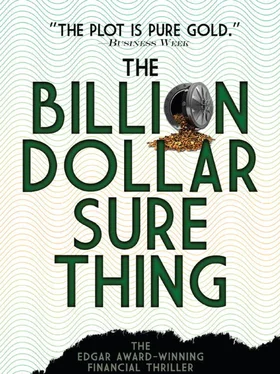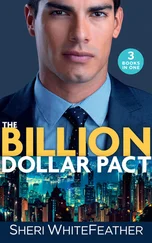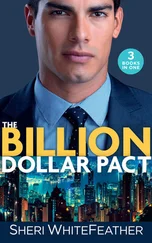Both men stepped out on the fourth floor.
“Tell me, Kellermann, what’s developed on the fellow from New York?”
“I expect we’ll have a full report waiting for us on the Telex. But I’m afraid that the news will not be good. Late yesterday afternoon I received a call from the Basel police, asking about Rosen.”
“What did they want to know?”
“The usual questions about his relationship with us. A kommissar named Bucher. He was quite firm about it. Said that if necessary he would get a court order. I felt that there would be no sense in going through that, so I did confirm that he was a client of ours and did an extremely large volume of business with us.”
“Did they want details?”
“No. But I’m positive that we have not heard the end of it by any means.”
“Is it really any worry of ours? After all, we did put a stop to him by asking for that additional $50 million margin.”
“Not exactly. The margin arrived first thing this morning.”
“And what did you do?”
“Well, what could I do? We made our conditions and he met them. We have been proceeding on his instructions.”
“Sometimes, Kellermann—” Hofer decided not to finish his thoughts aloud. Instead he turned abruptly without any further word and moved down the corridor to his office. It was seven forty-five central European time.
His secretary appeared the minute he reached his desk.
“Dr. Hofer, there are dozens of people who have already been trying to reach you this morning. At least half of them from the press. What should we do?”
“The usual. Tell them I’m not available. You know whom to put through if it’s absolutely necessary.”
“The Times man has been especially insistent. They have always been quite decent toward us, you know. He’s on the line right now, again.”
“All right, put him through. But that’s all. No other press for the rest of the day.”
Almost as soon as he had settled behind his desk, the phone rang. He lifted the receiver carefully, as he always did.
“Hofer speaking.”
“Dr. Hofer, this is Fred Hastings from the Times. I guess you know why I’m calling.”
“I’ve a fairly good idea, yes.”
“Well, I know that you hardly want to make any statement under the circumstances, but I would very much appreciate your thoughts on what might happen today. There are very strong rumours that you people are going to suspend foreign exchange trading this morning. Is that correct?”
“No, sir. That is incorrect. Frankly, I think you are talking to the wrong bank in the wrong country. The current problem is a dollar problem, not one of the Swiss franc. The issue is one facing the United States, not Switzerland. If trading is suspended, it will have to be the New York fellows who do it. We are open for business. All day.”
“Is it true that you people, along with those in Eastern Europe, have been as responsible as anyone for this sudden run against the dollar?”
“Hastings, you ought to know better than to ask a thing like that. Every time a currency gets into trouble, we in Zurich get accused by every boulevard paper on earth. You at the Times know that is simply preposterous. We are a very small fish in a huge pond. My position on the dollar is quite well known. I have said for years that it must be made convertible into gold. But I have always stated that this must be done in an orderly fashion, in cooperation with all the major countries in the world. These waves of speculation help no one.”
“But it is true that you would stand to make huge profits, on gold, for example, if such a decision were taken?”
“That is also not true. We maintain a stock of gold, just like our partner banks, because we make a market in gold. It’s quite logical that you can’t make a market in anything if you don’t have something on the shelf. But we have our risk in both directions as a result—as you yourself have pointed out in more than one article, Mr. Hastings.”
The Times man knew better than to press too much on this subject.
“Well, let me ask something else. If I walked into your bank right now and asked you to short a million dollars for me, would you do it?”
“It would depend upon the reason. We are not here to promote speculation. If you could show us a good commercial reason, or could demonstrate that you needed to hedge your private holdings, and if you were a client of our bank of long and good standing, we certainly would try to do our best for you. So would any other bank in the world. Whether we would advise you to do it at this time is another thing. The statement out of Washington yesterday was quite clear. If you short the dollar right now, it could turn out to be a very expensive bit of insurance, you know.”
“I deduce that you are quite sceptical concerning a dollar devaluation at this time?” asked the Times man.
“I am always sceptical about any devaluation rumours. Especially where the dollar is concerned.”
“May I quote you on that, Dr. Hofer?”
“You may. Now, Mr. Hastings, I’m afraid that I must go.”
“I understand. Thank you very much, sir. I appreciate your talking to me.”
As he hung up, Dr. Hofer’s secretary again entered the room.
“There’s one thing which I feel I should bring to your attention,” he said. “A certain Dr. George Bernoulli called very early this morning and left a message. He would like to see you, very urgently, on a private matter this morning. He suggested that he would be here shortly after nine and would appreciate it if you could receive him for just a few minutes.”
“That must be the young Bernoulli boy. All right, I think I can fit it in. Just send him right in when he arrives. I’ll be spending the next half hour or so getting up to date from the market reports stacked on my desk. Remember that at ten I expect the people from South Africa. After that I don’t want to be disturbed by anyone. Lunch should be sent into my office for all of us. And there must be absolutely no mention of this conference and the people involved to anyone in the bank. The only executive who will be involved is Kellermann. He will be here shortly before ten. Just have him come right in also.”
He turned his attention back to his desk.
Three stories down, in the foreign exchange department, the phones had just begun to light up. At eight forty-five twenty traders went into action simultaneously. The Deutsche Bank in Frankfurt was offering $25 million spot. The General Bank agreed to take them at the rate of 3.3015, the absolute floor price for the dollar, a level that had never been reached before. The Deutsche Bank accepted. The Crédit Lyonaise in Paris offered $50 million. They did not like the price. They would come back in ten or fifteen minutes. The Banque de Bruxelles wanted to sell $35 million three months forward. The trader consulted Zimmerer. They decided to put a 5 percent discount on the forward dollar: they offered Brussels the corresponding rate of 3.136. They did not even hesitate but accepted immediately. Two minutes later the Banca Nazionale de Lavoro was offered the same rate on $40 million. They also accepted. The traders huddled with Zimmerer. They decided to drop the three months forward rate another full percent. Then came the break.
“Zimmerer, come quick. It’s the Foreign Trade Bank, Moscow. They want to buy—buy!—$100 million spot and another $100 million three months forward. What should I do?”
“Gimme the call.”
He argued for a full five minutes before settling on a rate. He looked completely puzzled as he hung up the phone.
“Zimmerer, it’s Budapest. They want to buy $50 million spot. But they want a better rate.”
“Offer them 3.31.”
Читать дальше












